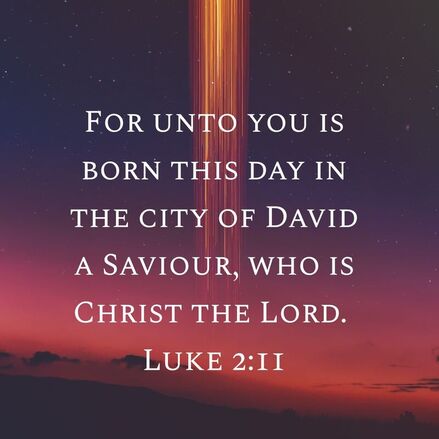|
Dear friends, We have just returned from the North of England visiting my cousins who are now in their 90s. They have been an important part of my life - not least because of their unfailing faith. Josie and Ivor have displayed the closest relationship with Christ that I have ever witnessed. Now, their age has made them extremely frail and as we said goodbye we were wondering if - for Ivor especially - it might be for the last time. Josie shared with us a hymn which she wanted at her funeral - and quoted it immediately, word for word from her memory: ‘Jesus, the very thought of Thee with sweetness fills my breast; but sweeter far Thy face to see, and in Thy presence rest.’ Bernard of Clairvaux, 1091-1153; tr. by Edward Caswall, 1814-78 (162 Christian Hymns) You may be thinking that this is a little morbid for a church newsletter. But far from it, because they have taken to heart the scripture - 2 Corinthians 5 v6-8: 6 So we are always confident, knowing that while we are at home in the body we are absent from the Lord. 7 For we walk by faith, not by sight. 8 We are confident, yes, well pleased rather to be absent from the body and to be present with the Lord. Our faith is going to turn to sight, and death is simply the beginning of that journey into the realm of sight. As Josie spoke to us it was so very clear that she is totally at peace. Most of us have passages of scripture that are important for us, and I am convinced that the Spirit gives us particular passages throughout our lives to hold on to, to encourage or to bless. My favourite is most definitely the doxology at the end of Jude. Having written some difficult words in his book he ends with: 24 Now to Him who is able to keep you from stumbling and to present you faultless before the presence of His glory with exceeding joy, 25 To God our Saviour, Who alone is wise, Be glory and majesty, Dominion and power, Both now and forever. Amen. It is a miracle that we will be ‘presented faultless’ - but what excites me is that Jude says ‘with exceeding joy’. If Jude were here in person I would ask him if it is the Lord rejoicing - or is it us. I think he would reply - ‘it's both!’. I think it's His joy to welcome me home, and my greatest joy to arrive safely. My dear friends, none of us (young or old) knows what the future holds, where the next step is going to lead, where the next curve in the road will take us - but if I know my God as I ought to know him - I can meet every situation with doxology. It ends with that little word - Amen - so be it. I hope and pray that you too can reply - ‘Amen!’ Yours in Christ, Paul
0 Comments
Dear friends, My father died in 1990, but I remember him telling me of an encounter that he had shortly after the end of World War 2. He was travelling from the coast (Dover I think) to Gillingham by train and he found himself in a carriage with a dishevelled man who he thought at first was a tramp. He had dirty clothes and a dirty worn overcoat. He struck up a conversation with this ‘tramp’ who turned out to be a Christian Jew. During the German occupation he had lost all his possessions, and then in a concentration camp he lost all his family. He was eating a stale crust of bread with some cheese. At the end of a brief conversation the man smiled and said in broken English…… “that was hell - this is heaven!” The fact that this man had lost everything in the most terrible circumstances, but was still able to smile and say he was ‘in heaven’ was a testament to his own faith, and had a profound effect on my father. Mary Butcher's testimony recently was a powerful encouragement to us all, and I love her for it. Philippians 4 verse 11 says …..for I have learned, in whatever state I am, therewith to be content. (Later in verse 13 Paul goes on to say ‘I can do all things through Christ which strengtheneth me’.) We all suffer loss and difficulties in life - some more than most. But it's how we deal with these events that not only mark us out, but can have a profound effect on those around us. This life - with all of its joys - and sorrows, with all of its blessings and troubles, is so very short compared to the eternity we will have with Christ. Billy Graham was once asked ‘what is the greatest surprise you have found about life’? He replied “the brevity of it”. To grasp this truth places all other matters in perspective. We have much to be thankful for. Let our prayers reflect this - even in the most difficult times - as well as in the good times. Yours in Christ, Paul Dear friends, God wants us to live with Kingdom authority, but there can be no reigning in this life until we confess, “Jesus is Lord” To proclaim someone as Lord means to recognise that someone or something has power and authority. When we claim to give our lives to Christ we surrender to His Lordship. The Bible makes it very clear that Christ is Lord of all things. He is the Lord of the heavens, Eph 1:2; He is the Lord of the Church, Eph 1:22; He is the Lord of our lives. This is not something we have naturally discovered, rather it is by the Spirit of God that we are enabled to say, “Jesus is Lord”. 1 Cor 12:3 - ‘No one can say, “Jesus is Lord” except by the Holy Spirit.’ Of course, the Holy Spirit opens our eyes to the redeeming claim of Christ’s Lordship. He has enabled us to see the resurrection conquest of His Lordship, yet for our part, there must be confession of His Lordship, as Paul says in Romans 14:11, ‘It is written, “As surely as I live,” says the Lord, “every knee will bow before Me and every tongue confess to God.”’ As we confess Jesus as Lord our salvation is confirmed and sealed. Let’s praise God for opening our eyes to see the truth that ‘Jesus is Lord!’ Yours in Christ, Pastor Tim Dear friends, As I prepare our midweek meeting studies in the book of Habbakuk, I find Habbakuk’s frustration at why God does certain things resonates with me! Habbakuk was certainly not questioning the Sovereignty of God, he simply could not understand how a holy God could tolerate evil for such a long time. It’s a question that we all grapple with: why does a holy God allow injustice and evil to remain? Of course, Habbakuk had to learn that God allows evil to remain to reveal the wickedness of the human heart, but also to show that God even uses wicked people to accomplish His purposes. See how Peter expresses this in Acts 2:23 when addressing the people on the Day of Pentecost, “This man was handed over to you by God’s set purpose and foreknowledge; and you, with the help of wicked men, put him to death by nailing him to the cross.” Here we see how God not only accomplishes His eternal decrees by using wicked men, but is able to triumph in it. Joseph puts it perfectly in Genesis 50 v 20. He boasted about being Jacob’s favourite son; the brothers took matters into their own hands and what they did was far more evil than Joseph’s bragging. Yet when all was revealed Joseph said to them, “You meant evil, but God intended it for good to accomplish what is now being done, the saving of many lives.” This gives us confidence in the sovereign plans of God, and therefore we can conclude with the Apostle Paul, “We know that in all things God works for the good of those who love Him, who have been called according to His purpose.” (Romans 8:28) Yours in Christ Pastor Tim Dear friends, I am hoping to do a two part study on “What is an Evangelical?” I believe this is a crucial subject, because we need to know and define what an evangelical is and what we stand for as evangelicals. Evangelicalism has its roots in the Word of God, where the key characteristics are the centrality of the Word of God, the centrality of Christ and the centrality of the Cross. Unfortunately, a wave of opposition comes in to discredit those beliefs and there is so much confusion today where many are not sure about the evangelical position. So my aim will be to define evangelicalism, what we stand for and what we need to watch out for. If men are really evangelical, they delight to spread, as glad tidings, the truths for which they take the Name. I commend these studies to you in prayer. Yours in Christ Pastor Tim Dear friends, We have to accept that none of us knows the day on which Jesus was born. We do not know the date or the time. According to tradition, we follow the early Christian Church in choosing 25th December as the day we focus on remembering His birth. This day was selected because it coincided with all the pagan festivals and the early Christians wished to divert attention from those festivals and direct it instead to celebrating the incarnation of the Lord Jesus Christ. Personally, I am glad that Christmas is celebrated in December. It is the darkest month of the year, when the days are short and the nights are long. The twinkling lights that illuminate shopping centers and homes attempt to defy this darkness. Remember that when Christ came into the world, Israel was suffering from real spiritual darkness. The religious leaders of the day were corrupt. The king was corrupt and the people had no voice. But the light came when Jesus was born. He came to bring light into this dark world. He came to destroy the forces of evil that enslave us in sin. In Jesus, light overcomes darkness. And that is why Christians celebrate His coming at Christmas time. We rejoice that God became man to deliver us from darkness. He died in the place of sinners to bring us back to God. Now Jesus says to all who will listen, "I am the Light of the World. He who follows me shall not walk in darkness, but have the light of life." (John 8:12). It is just as we sing it in the words of the carol: Silent night, holy night Son of God, Love's pure light radiant beams from Thy holy face with the dawn of redeeming grace. Jesus, Lord, at Thy birth I trust and hope you will all have a good Christmas Yours, in Christ Pastor Tim |
|







